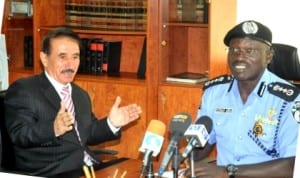Editorial
UNEP Report: Time For Action

Ambassador, United Arab Emirates, Amb. Mahmood Mohammed (left), with IGP Suleiman Abba, during a courtesy visit to the police headquarters, Abuja, yesterday.
Nigeria’s Minister of Petroleum Resources,
Mrs Diezani Allison-Madueke says the
Federal Government was ready to start the implementation of the United Nations Environmental Programme (UNEP) Report on Ogoni, Rivers State.
According to a statement she sent to a consultative meeting with eminent Ogoni leaders in Bori last Friday, Mrs Allison-Madueke said funds were already available for the clean-up to start in three months and called on all stakeholders to come up with ideas to achieve the goal.
This promise should ordinarily excite Ogoni and neighbouring Rivers communities whose lands and waters had been polluted by oil and gas exploration and exploitation in Rivers State, but this will not be the first time the Federal Government would commit to implementing the report.
After all the protests, litigations and all that resulted in the UNEP Report, the Federal Government of Nigeria pledged to carry out an immediate implementation of the report. But even as the firms that were supposed to contribute to the programme were ready, the Nigerian Government was not.
It was, therefore, not surprising that the Ogonis at the consultative meeting said that the current move by the Federal Government should not turn out to be another political agenda. Three years after the Federal Government accepted the report, the failure to implement it can hardly be explained.
Sources also suggest that this belated meeting with leaders of Ogoniland may not be unconnected with recent protests, threats and even resolve to start another wave of protests within and outside Nigeria. Indeed, the lack of trust appears to be everywhere and this should never be the case.
That is why The Tide wants to urge the Federal Government to ensure that they prove all doubting Thomases wrong this time. Clearly, there are so many reasons why the implementation of the UNEP Report should not be delayed for even another day because of the danger it poses to the people.
It is sad that even when the handling of the UNEP Report had brought so much bad image to Nigeria, even as the United Nations is supposed to be involved, the Nigerian Government had treated the matter with indifference even when the lives of some indigent Rivers communities are at risk.
Even as we want to join millions of well-meaning persons across the globe to hope against hope, the Federal Government has not given facts and figures that would back their promise. Of course, it will be necessary to know how much money had been set aside and the groups that contributed them. It is pertinent to ask if the Federal Government has made any financial commitment.
Also worrisome is the apparent use of one of the world’s biggest environmental degradation for cheap and avoidable political manipulation. This is more so because, whereas the epic centre of the degradation is in Ogoni, Rivers State, HYPREP, the agency that is expected to midwife the programme is sited in Yenagoa, Bayelsa State.
The Tide is, however, worried that some persons at the federal level may be trying too hard to impress President Goodluck Jonathan by diverting everything that is due the South-South to Bayelsa State. The fact remains that Port Harcourt, the Rivers State capital is the oil and gas capital of Nigeria and the headquarters of the South-South geo-political zone of Nigeria.
Naturally, therefore, HYPREP and the Nigerian Content Development Board should be sited in Port Harcourt. It should be re-stated that HYPREP has nothing to do with Yenagoa, except to scuttle the implementation of the UNEP Report and or endanger the lives of persons that will interface with the agency. Already one of such trips had resulted in a road crash.
While many people would expect to see the commencement of work on the UNEP Report instead of promises, we think that the Federal Government still has a lot to do to facilitate a hitch-free remediation of the Rivers communities. This will include the return of HYPREP to Port Harcourt, funding reliability among others.
We think that the Nigerian government should not continue to gamble with the lives of her people. In the Rivers communities devastated by oil pollution over the years have resulted in the death of many and pauperisation of all as the environment has failed to produce.
The fact is that as the hydrocarbon continues to sink into the environment, even potable water is a luxury, ill-health and the attendant complications are rife, while the fate of generations un-born is being mortgaged. Everything should be done to stop all that now. Please.
Editorial
Resolve Rumuwoji Market Issues, Others

Editorial
As NDG Ends Season 2

Editorial
Beginning A New Dawn At RSNC

-
Politics3 days ago
2027: NIGERIANS FAULT INEC ON DIGITAL MEMBERSHIP REGISTER DIRECTIVE
-

 Environment3 days ago
Environment3 days agoLAWMA Director Says Sweeping Reforms Have Improved Waste Collection
-
Politics3 days ago
LP Crisis: Ex-NWC Member Dumps Dumps Abure Faction
-

 Politics3 days ago
Politics3 days agoUmahi Dismisses Allegations On Social Media, Insists On Projects Delivery
-

 Sports3 days ago
Sports3 days agoAbia Not Sure To Secure continental Ticket
-
Politics3 days ago
NATASHA ELECTRIC VEHICLES INITIATIVE IN KOGI CENTRAL
-
Sports3 days ago
La Liga: Yamal Records First Career Hat-trick
-

 Sports3 days ago
Sports3 days agoPSG Extend Lead In Ligue 1

